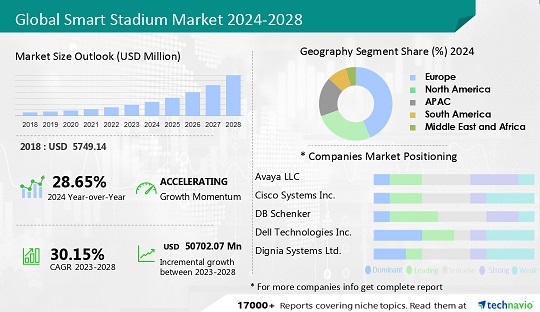New York, Jan. 15, 2024 (GLOBE NEWSWIRE) -- The smart stadium market is estimated to grow by USD 50.70 billion from 2023 to 2028, growing at a CAGR of 30.15%. The smart stadium market is fragmented owing to the presence of many global and regional companies. A few prominent companies that offer smart stadium market are Avaya LLC, Cisco Systems Inc., DB Schenker, Dell Technologies Inc., Dignia Systems Ltd., GP Smart Stadium, Hawk Eye Innovations Ltd., Hewlett Packard Enterprise Co., Honeywell International Inc., Huawei Technologies Co. Ltd., Infosys Ltd., Intel Corp., International Business Machines Corp., Johnson Controls International Plc, Lumen Technologies Inc., NEC Corp., Nippon Telegraph and Telephone Corp., Telefonaktiebolaget LM Ericsson, Weblib, and DS worldwide Ltd. The report provides a full list of key companies, their strategies, and the latest developments. Download a Free Sample before buying

Company Offering:
- Avaya LLC - The company offers a sports team engagement mobile app that can digitize the fan experience before, during, and after the game.
- Cisco Systems Inc. - The company offers a connected stadium solution that enables stadiums across the globe to address evolving market trends and fan needs with next-generation sports and entertainment experiences.
- Dell Technologies Inc. - The company offers smart stadiums for addressing public safety emergencies, from surveillance cameras to biometric scanners.
- For details on companies and their offerings – Buy the report!
By Geography, the market is classified as Europe, North America, APAC, South America, and Middle East and Africa. Europe will have the largest share of the market. The region will contribute 38% to the growth of the global market during the forecast period. Along with a sporting event like the Olympics, one of the primary factors driving the smart stadium market in the region. Furthermore, the region is home to many popular sports leagues, including the PREMIER LEAGUE and The Championships, Wimbledon. Sports fans belonging to Generation Z, especially those in Western Europe, are increasingly exposed and used to hyper-digital connectivity, customer centricity, and convenience, which drives the demand for smart stadiums in the region. Download a free sample report to get more insights on the market share of various regions and the contribution of the segments.
- Impactful driver- Enhancements in operational efficiency are driving the Smart Stadium Market, notably driven by the integration of e-sports, cashless payments, smart security systems, surveillance cameras, and crowd management solutions. Additionally, energy management, wearable technology, data analytics, and digital signage play significant roles. These advancements streamline operations, improve security, optimize energy consumption, and personalize fan experiences. Such innovations drive market growth by amplifying the stadium experience and boosting seamless, technology-driven interactions.
- Key Trend - The Smart Stadium Market is witnessing a transformative trend with the emerging presence of augmented reality (AR) in stadiums. This trend, alongside virtual reality (VR), IoT, G connectivity, Wi-Fi solutions, artificial intelligence, blockchain technology, digital ticketing, beacon technology, and facial recognition, shapes the market's growth. AR's integration elevates fan experiences, offering immersive interactions during events. This amalgamation of advanced technologies enhances connectivity, personalization, and engagement, shaping the future landscape of stadium experiences.
- Major Challenges - The escalating appeal of household consumer electronic gadgets set a substantial hurdle impeding Smart Stadium Market growth. This challenge affects mobile apps, sustainable infrastructure, fan engagement tools, predictive maintenance, stadium Wi-Fi analytics, contactless services, social media integration, seat upgrade technology, food and beverage management, real-time feedback systems, emergency response systems, and accessibility solutions. The pervasive use of personal gadgets alters fan preferences, demanding enhanced integration and innovation to sustain stadium engagement amidst evolving consumer habits.
Market Segmentation
- The digital content management segment. Digital content management forms the largest software segment for the smart stadium market. The digital content management segment deals with video management, digital signage, and mobile content management. The benefits offered by digital content management include higher spectator engagement and improved spectator experience through signages, promotional activities, and personalized content, thereby acting as a source of revenue for stadium management.
Technavio Research experts have provided more insights on the market share of segments - View a Free Sample Report
Related Reports:
The Smart Workplace Market size is estimated to grow at a CAGR of 12.12% between 2022 and 2027. The market size is forecast to increase by USD 28.66 billion.
The smart rings market size is estimated to grow at a CAGR of 21.39% between 2022 and 2027. The market size is forecast to increase by USD 34.40 billion.
About US
Technavio is a leading global technology research and advisory company. Their research and analysis focus on emerging market trends and provide actionable insights to help businesses identify market opportunities and develop effective strategies to optimize their market positions. With over 500 specialized analysts, Technavio’s report library consists of more than 17,000 reports and counting, covering 800 technologies, spanning 50 countries. Their client base consists of enterprises of all sizes, including more than 100 Fortune 500 companies. This growing client base relies on Technavio’s comprehensive coverage, extensive research, and actionable market insights to identify opportunities in existing and potential markets and assess their competitive positions within changing market scenarios.
